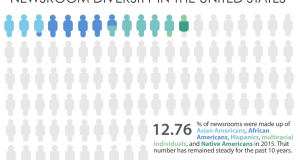The entire middle school lunchroom is watching as a black boy calls a Taiwanese boy a dreaded slur in the pilot episode of “Fresh Off the Boat.”
In a moment that becomes the climax to 12-year-old Eddie Huang’s terrible first day at a new school in Florida, the boy utters the word, “chink.”
“Fresh Off the Boat” pushes racial and social issues such as the Asian American model minority myth. The show fits in at ABC, a network that prides itself on breaking barriers in family sitcoms, including “Modern Family,” which premiered in 2009 featuring two gay white dads raising an adopted Asian daughter.
The significance of “Fresh Off the Boat” isn’t lost on critics after the show’s first season: the fictional Huang family is the first leading Asian family on American television in 20 years.
About 7.9 million watched the pilot, according to Nielsen ratings on TVSeriesFinale.com. By season’s end, about 5.75 million tuned in for the finale. For comparison, about 7.1 million watched the “Modern Family” season finale.
It hits home for AAJA member Jeff Yang, a Wall Street Journal TV writer whose son, Hudson, 11, landed the role of Eddie Huang on the show. Yang grew up in the U.S. and faced many of the same cultural confrontations as his son’s TV character: kids calling his food smelly and making fun of the way Asian names sound.
In the show, set in 1995 — and renewed for a second season — the Huangs uproot from their home in Chinatown in Washington, D.C., and move to Orlando, where they are the only Asians in their neighborhood. Eddie and his younger brothers learn about the importance of their identity as their father learns the ups and downs of running a business and their mother works to fit into the community.
The show is a “such a huge, huge revolution,” Yang said, proving to the world that the Huangs and other Asians are as American as the Joneses or the Smiths.
But the show points to the deeper issue of the dearth of Asians on television. An article published by the network Fusion, a joint venture by Disney-ABC Television and Univision, notes that of 800 main cast members on 100 network TV shows, 6.6 percent of main cast members are of Asian descent. Out of the actors in the survey, 37.9 percent of the shows have at least one Asian main cast member, and 7.8 percent of shows have multiple Asian main cast members.
Even when Asians are on television, they seem to be problem-free and speak perfect English, which isn’t necessarily reflective of Asians in America, said Xing Lu, who teaches a course on Asian American media representation at DePaul University in Chicago.
The last time an Asian American family was featured on U.S. sitcom was 1994, in “All-American Girl.” Comedian Margaret Cho starred as a rebellious Korean American young adult who butted heads with her family.
It lasted only one season, but some of its lasting memories were from off-screen. Cho was called too fat for the camera and had to lose weight, and she struggled with drug addiction, as she told KoreAm Magazine.
Where “Fresh Off the Boat” is faring better, according to Yang, of The Wall Street Journal, is that it was created with Asian Americans. It’s based on the memoir of New York City chef Eddie Huang. Show creator and Nahnatchka Kahn is Persian American, and executive producer Melvin Mar is Chinese American.
Dabbling in topics including stereotypes about Asians, assimilation and identity the way “Fresh Off the Boat” does is a success in itself, Yang said.
But the show isn’t necessarily perfect, Lu said. The stereotypes on it are often so exaggerated that no one could actually believe they’re true.
It also risks reinforcing what it puts on air, Lu said.
But perhaps the millions of TV sets featuring “Fresh Off the Boat” will bring more understanding of Asian American culture, said Kristina Wong, an Asian American comedian.
She said that as more media emerges, those perceptions could broaden, too.
Wong knew “American Girl” well: the show came out when she was in high school.
Now, viewing Fresh Off the Boat, Wong appreciates how Constance Wu’s character Jessica Huang is depicted as a “tiger mom” but shows her vulnerabilities throughout the series’ first season.
The stereotype is that Asian Americans just show up and magically achieve success, she said.
“We’re not these machines,” Wong said.
And that, Lu said, is progress.
Even the title of the show switched up the traditional meaning of the phrase “fresh off the boat” to show Asians adjusting into a new culture, she said — “not as a slur, but embracing the issue.”
“It takes ownership of the term,” she said.
 VOICES Publishing from the AAJA National Convention
VOICES Publishing from the AAJA National Convention








